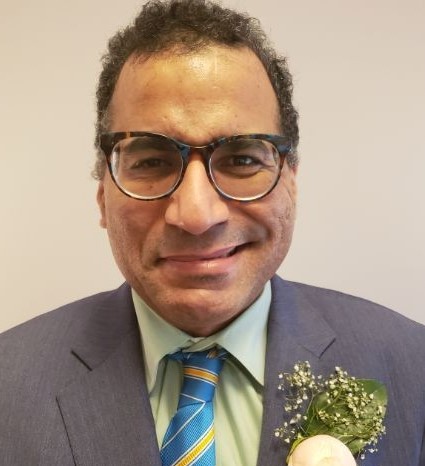
On October 20, Marc testified before the New York State Assembly Standing Committee on People With Disabilities and the Standing Committee on Labor Assembly Subcommittee on Employment Opportunities For People With Disabilities. With Marc’s permission, his remarks are excerpted below and lightly edited. You can watch the video of his testimony via the New York State Assembly website.
[Editor's note: The opinions and ideas expressed below are the author's own and do not reflect the views of the American Foundation for the Blind.]
Deafblind Accessibility Is Key to Prosperous, Sustainable Economy
Good morning, everyone! My name is Marc Safman. I am not “disabled.” I am deafblind due to hearing and vision challenges. I am a board member of the American Association of the DeafBlind (AADB) and a founding member of New York DeafBlind Advocates. I’ve been working in anti-money laundering compliance (AML) roles for over 15 years. New York is one of the wealthiest states in our country, yet we don’t have a statewide CoNavigator program, or a commission focused on deaf, deafblind, and hard of hearing issues. New York has the largest deafblind population in America, yet only 35% are employed. Alabama, Arkansas, and Louisiana offer greater assistance to their residents.
Early Identification of Health Challenges Key to Identifying Needed Accommodations
Because New York lacks guidelines, for 14 years, no hearing or vision health professionals referred me to state resources. I eventually found out about the New York State Commission for the Blind after I lost my job over using magnification globes. No state program has referred me to groups like: Blind Institute of Technology, Hadley, or Job Accommodation Network. State agencies (Access, DOL, NYSCB) lack sophisticated understanding of employment issues. The New York City Commission on Human Rights (NYCCHR or Commission) and Mayor’s Office for People with Disabilities (MOPD/Mayor’s Office) are run by political appointees.
Institutionalizing Meaningful Access to Effective Communication
Networking and easy access to accommodations are keys to a successful career. Yet, if you contact MOPD for help, they merely call and ask an event organizer to cooperate. If they refuse, MOPD tells you to file a complaint. The Commission offers no help. They make you come back weeks, months later to speak with a Law Enforcement Bureau (LEB) attorney. Even then, there is no guarantee the Commission will help. NYCCHR senior attorneys readily make excuses not to enforce city laws. Information is outdated and incomplete. The Commission’s 2018 Disability Guidance fails to include information about an IRS tax credit for small businesses (Form 8826).
Companies spend more time developing hashtag strategies than they do changing policies that prevent accommodations from being made. Instead of focusing on advancing my career, I’ve wasted time navigating city, state, and federal complaint processes to get needed accommodations.
COVID-19 has moved events online, yet virtual meeting platforms only offer closed caption format captions. None offer captions in open captions/CART format. Accessing CART is not the only problem. The Association of Certified Anti-Money Laundering Specialists (ACAMS) is the leading anti-money laundering compliance (AML) association. Earlier this year, ACAMS told me they did not offer audio transcripts or the option for closed captions. It took months dealing with their external counsel to get transcripts. With no good-faith interactive process, it’s up to me, the deafblind guy, to persuade businesses to make accommodations.
MacGyvering the Job Search, Networking
I can only make calls from home with CapTel service on a 23-inch monitor because CapTel handset screens are too small. I have to place calls because CapTel has technical issues. Google Meet offers the best captions; however, you can’t initiate contact with someone that way. There are no easy solutions. If I could afford to, I’d get a data package for the tablet I take to events. It’s critical to have mobile access to Google Live Transcribe, camera, high speed Wi-Fi/internet. Insurance companies consider my reading glasses and hearing aids luxuries. A Samsung phone and Nu Eyes low vision goggles let me live my life without barriers.
Despite amazing advancements in technology, New York laws have failed to keep up. Lost opportunity is the undue burden. Prioritizing accessibility is the key to a more prosperous, sustainable future. Accessibility creates good quality, value adding jobs; strengthens communities by welcoming everyone to pursue rich lives in New York. Lift everyone up!
Thank you.
Marc Safman, CAMS Connect with Marc on LinkedIn.